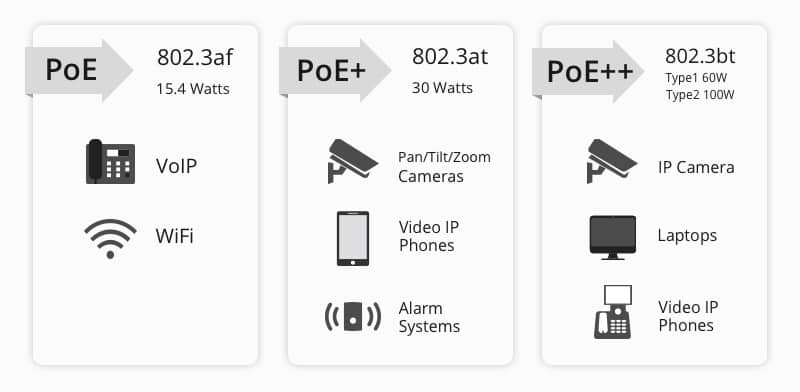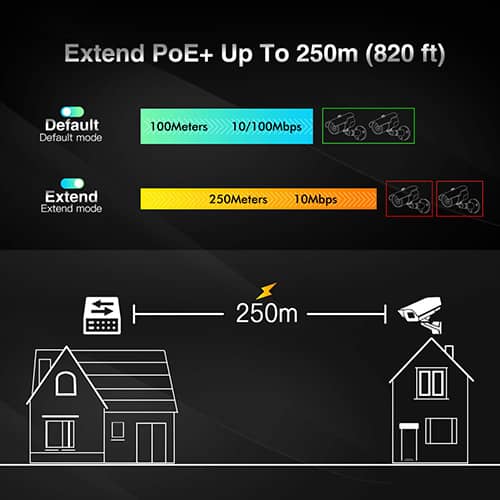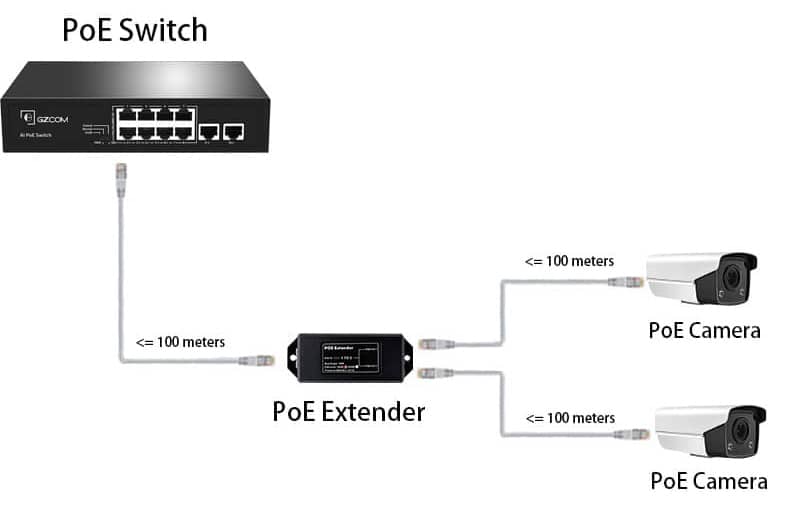Please submit your message online and we will contact you as soon as possible!
- Experience security and speed, without compromise.

2025-04-11
Network deployment planning requires thorough understanding of basic technology constraints when the network requires extensive distance coverage. Standard Ethernet switches together with modern PoE switches use Ethernet cables for data transfer but their power delivery capacity varies based on distance. GZCOM, a leading provider of network infrastructure solutions, delves into the distance limitations of PoE and compares it with the data transmission capabilities of standard Ethernet.
Standard Ethernet encounters its maximum restriction through Ethernet specifications no matter what type of switch is being used including basic or Power over Ethernet. The IEEE 802.3 specifications determine that copper Ethernet cables including Cat5e, Cat6, and Cat6a should not exceed 100 meters (328 feet) for maintaining reliable data transmission speeds.
A network connection outside the established 100-meter restriction will experience weakened signal strength and longer delays that can cause performance problems or service blackouts. The distance restriction affects the transmission of both data signals alongside power in situations involving PoE.
PoE technology adheres to the same 100-meter (328 feet) distance limitation as standard Ethernet for both data and power delivery. This means that a PoE switch can reliably supply power to a compatible device up to this distance. Beyond this, the power delivered to the end device may become insufficient for proper operation due to voltage drop along the cable.
Factors affecting PoE power delivery over distance include:
Cable Quality: The delivery of power through PoE experiences better performance when solid copper core cables replace low-quality or copper-clad aluminum (CCA) cables.
PoE Standard: The delivery strength of PoE depends on the selected standard among 802.3af, 802.3at, 802.3bt. The delivery of power through higher power standards suffers greater voltage reduction when transmitted over extended cable lengths.

Power Consumption of the Device: The voltage drop will affect devices more when their power consumption needs exceed the capabilities of longer cable runs.

While standard Ethernet switches don't supply power, their data transmission is also subject to the same 100-meter limitation. To establish dependable data exchange connections which exceed the distance limit you should deploy network extension tools.
When considering long-distance network deployments, the key difference between a PoE switch and an Ethernet switch lies in the combined limitation of both data and power for PoE.
With a PoE switch, you are constrained by the 100-meter limit for both reliable data transmission and sufficient power delivery. Exceeding this limit can result in both data connectivity issues and the connected PoE device not receiving enough power to function correctly.
Data reliability forms the main challenge of the 100-meter distance limit for standard Ethernet switches that transmit data alone. Separate power solutions will be necessary for remote devices connected to an Ethernet switch since power delivery extends beyond the 100-meter limit. Therefore, implement additional power solutions at each remote device location which increases complexity and cost.

High-performance PoE switch 100M full load stable transmission can reach 150 meters, that 250 meters transmission distance is what is going on?
In fact, the way is there, if the rate down to 10M, that is, the transmission bandwidth of 10M, the transmission distance can be extended to 250 meters (depending on the quality of the network cable), the use of this technology does not provide a high bandwidth, bandwidth from 100M to become compressed into 10M, does not facilitate the monitoring of the image of the smooth transmission of high-definition.
Fortunately, several solutions exist to overcome the 100-meter limitation for both Ethernet and PoE switch deployments:
PoE extenders are devices that can be placed inline with the Ethernet cable to regenerate the data and power signals, effectively extending the reach beyond 100 meters. Some extenders can even daisy-chain multiple units to achieve even greater distances.

For very long distances, converting the Ethernet signal to fiber optic and then back to Ethernet at the destination is a reliable solution. Fiber optic cables support much longer distances (often kilometers) with minimal signal loss. This would require fiber optic media converters at both ends.
While not ideal for all scenarios due to potential latency increases and network management complexities, you can connect multiple Ethernet switches or PoE switches in a series to extend the network reach. However, remember that each 100-meter segment will introduce potential signal degradation.
In situations where running physical cables is impractical, wireless bridges can be used to establish a network connection over longer distances. This is an alternative to wired solutions but may be subject to environmental factors and interference.
The best approach for extending network reach depends on factors such as the distance required, the number of devices, bandwidth requirements, budget, and environmental conditions. For simple extensions beyond 100 meters for PoE devices, PoE extenders are often the most cost-effective and straightforward solution. For significantly longer distances or when dealing with data-only connections, fiber optic converters might be necessary.
At GZCOM, we understand the challenges of deploying networks over long distances. We offer a range of reliable PoE switches and networking accessories, including PoE extenders and media converters, to help you overcome distance limitations and build robust, long-range network infrastructures. Contact our networking experts for guidance on the best solutions for your specific long-distance deployment needs.
Please submit your message online and we will contact you as soon as possible!